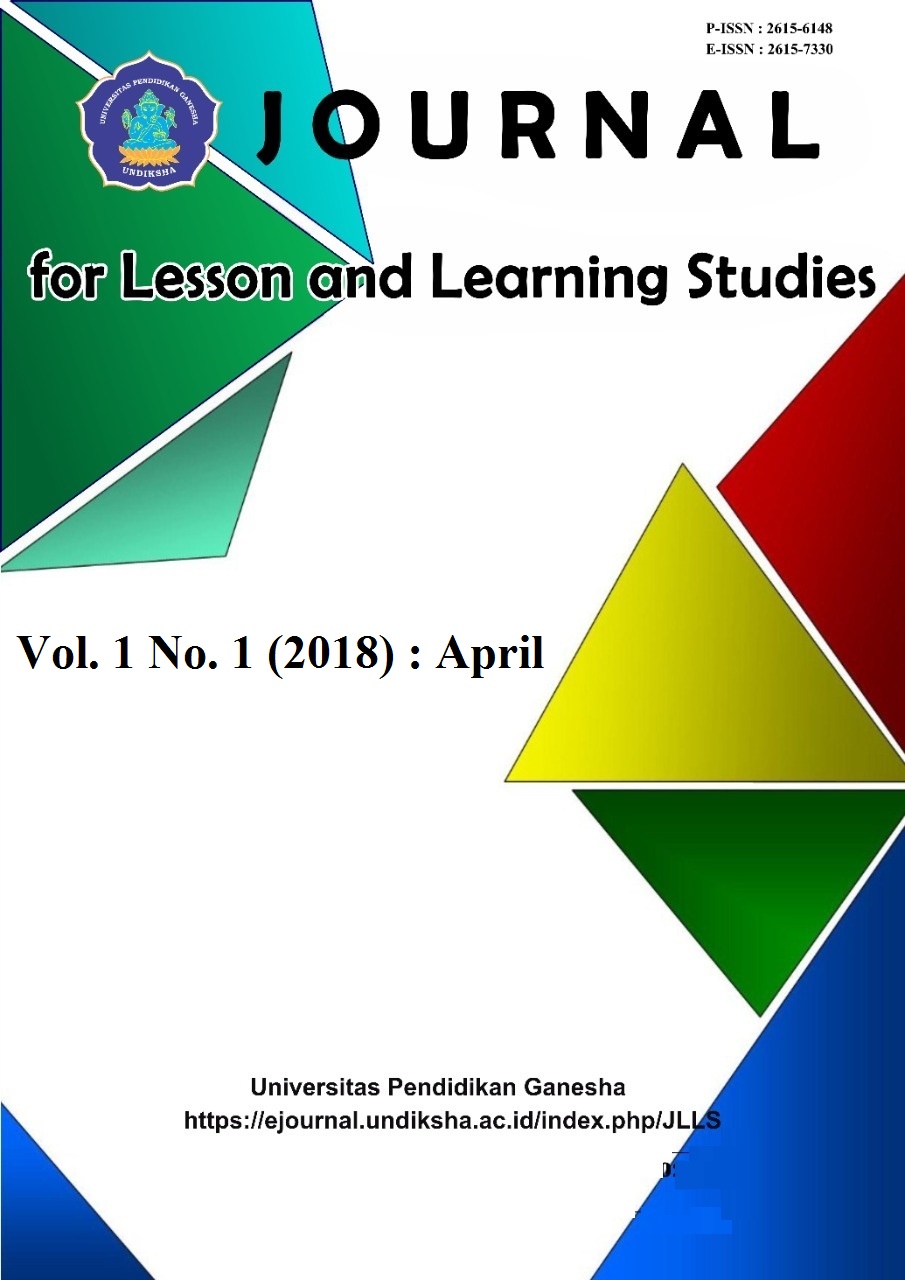KORELASI ANTARA GAYA BELAJAR DAN MOTIVASI BELAJAR SISWA KELAS IV SD GUGUS UBUD KECAMATAN UBUD TAHUN PELAJARAN 2017/2018
DOI:
https://doi.org/10.23887/jlls.v1i1.14619Abstrak
The research was aimed at determining the significant correlation between learning style and learning motivation of the fourth-grade students in Gugus Ubud Elementary School Ubud Sub-district in the academic year 2017/2018. The study used ex-post facto research by using Product Moment correlation technique and multiple-linear regression. The population of this research was all students in the fourth-grade of Gugus Ubud in the academic year 2017/2018 consisting of 205 students. The samples were obtained using proportional random sampling so that 150 students were chosen in this research.The data were collected using non-test method which used the questionnaire of learning style and learning motivation as the instrument. The result of the research was analyzed using descriptive statistic analysis and inferential statistic analysis research by using product moment correlation technique and multiple-linear regression in which the prerequisite tests were normality test, linearity test, and multicollinearity test. The analysis shows that: (1) there is the significant correlation between visual learning style and learning motivation in which rx1y = 0,277 and ry1.23 =0,214 >rtable5% = 0,159 as well as effective contribution = 4,9%, (2) there is the significant correlation between the auditory learning style and learning motivation in which rx2y = 0,556 and ry2.13 = 0,509 as well as the effective contribution = 27,4%, (3) there is the significant correlation between the kinesthetic learning style and learning motivation in which rx3y = 0,253 and ry3.12 = 0,168 as well as the effective contribution = 3,5%, (4) simultaneously, there is the significant correlation between the visual, auditory, and kinesthetic learning style and the learning motivation of the four-grade students of in Gugus Ubud Elementary School Ubud Sub-district in the academic year 2017/2018 in which Fcount = 27,186 > Ftable = 2,68 as well as the effective contribution = 35,8%.Referensi
Agung, Anak Agung Gede. 2014. Metodologi Penelitian Pendidikan. Malang: Media Publishing.
Agung, Anak Agung Gede. 2017. Statistik Iferensial Untuk Pendidikan. Singaraja: Fakultas Ilmu Pendidikan Universitas Pendidikan Ganesha.
Chania, Yen, dkk, 2016. Hubungan Gaya Belajar Dengan Hasil Belajar Siswa Pada Pembelajaran Biologi Kelas X SMAN 2 Sungai Tarab Kabupaten Tanah Datar. Sumatera Barat: IAIN Batusangkar (diakses pada tanggal 3 januari 2018).
DePoter, Bobbi, & Hernacki, Mike. 2016 Quantum Learning.Bandung: PT Mizan Pustaka.
Djaali, 2014. Psikologi Pendidikan. Jakarta: Bumi Aksara.
Khusna, Vinani Khayatul. 2016. Korelasi Gaya Belajar Dengan Motivasi Belajar Siswa Kelas IV SDN Kardinan 02 Dolopo Madiun Tahun Pelajaran 2015/206.Ponorogo: STAIN (diakses pada tanggal 3 Januari 2018).
Prawira, Purwa Atmaja. 2016. Psikologi Pendidikan dalam Perspektif Baru.Yogyakarta: Ar-Ruzz Media.
Sani, Ridwan Abdulah. 2013. Inovasi Pembelajaran. Jakarta: Bumi Aksara.
Sardiman, A.M. 2016. Interaksi &Motivasi Belajar Mengajar. Jakarta: PT. Raja Grafindo Persada
Ula, Sohimatul S. 2013. Revolusi Belajar. Yogyakarta: Ar-Ruzz Media.
Uno, Hamzah B. 2012. Orientasi Baru Dalam Psikologi Pembelajaran. Jakarta: PT. Bumi Aksara.
Uno, Hamzah B. 2016. Teori Motivasi & Pengukurannya : Analisis Di Bidang Pendidikan. Jakarta: PT. Bumi Aksara.
Unduhan
Diterbitkan
Cara Mengutip
Terbitan
Bagian
Lisensi
Authors who publish with the Journal for Lesson and Learning Studies agree to the following terms:
- Authors retain copyright and grant the journal the right of first publication with the work simultaneously licensed under a Creative Commons Attribution License (CC BY-SA 4.0) that allows others to share the work with an acknowledgment of the work's authorship and initial publication in this journal.
- Authors are able to enter into separate, additional contractual arrangements for the non-exclusive distribution of the journal's published version of the work (e.g., post it to an institutional repository or publish it in a book), with an acknowledgment of its initial publication in this journal.
- Authors are permitted and encouraged to post their work online (e.g., in institutional repositories or on their website) prior to and during the submission process, as it can lead to productive exchanges, as well as earlier and greater citation of published work. (See The Effect of Open Access)




